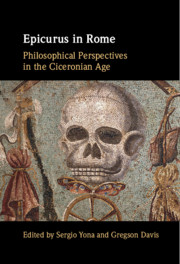Book contents
- Epicurus in Rome
- Epicurus in Rome
- Copyright page
- Contents
- Illustrations
- Contributors
- Acknowledgements
- Chapter 1 Introduction
- Part I Epicurus and Roman Identities
- Chapter 2 Sint Ista Graecorum: How to be an Epicurean in Late Republican Rome – Evidence from Cicero’s On Ends 1–2
- Chapter 3 Cicero’s Rhetoric of Anti-Epicureanism: Anonymity as Critique
- Chapter 4 Was Atticus an Epicurean?
- Chapter 5 Caesar the Epicurean? A Matter of Life and Death
- Chapter 6 Otium and Voluptas: Catullus and Roman Epicureanism
- Part II Epicurus and Lucretian Postures
- Bibliography
- General Index
Chapter 2 - Sint Ista Graecorum: How to be an Epicurean in Late Republican Rome – Evidence from Cicero’s On Ends 1–2
from Part I - Epicurus and Roman Identities
- Epicurus in Rome
- Epicurus in Rome
- Copyright page
- Contents
- Illustrations
- Contributors
- Acknowledgements
- Chapter 1 Introduction
- Part I Epicurus and Roman Identities
- Chapter 2 Sint Ista Graecorum: How to be an Epicurean in Late Republican Rome – Evidence from Cicero’s On Ends 1–2
- Chapter 3 Cicero’s Rhetoric of Anti-Epicureanism: Anonymity as Critique
- Chapter 4 Was Atticus an Epicurean?
- Chapter 5 Caesar the Epicurean? A Matter of Life and Death
- Chapter 6 Otium and Voluptas: Catullus and Roman Epicureanism
- Part II Epicurus and Lucretian Postures
- Bibliography
- General Index
Summary
In this chapter, I examine to what extent Epicurus’ message was still relevant as such in the late Roman Republic and to what extent it had to be adapted to the new ideological and political circumstances. An analysis of books 1 and 2 of Cicero’s On Ends shows that Cicero had perfectly appropriated the Greek philosophical tradition and that he basically thought along the lines of the age-old school discussions. A typically Roman context seems to have had only limited influence on his argument: his conception of virtue, for instance, or his stress on the importance of the brilliant achievements of famous ancestors, though illustrated with many Roman examples, are borrowed from traditional Greek arguments. His attack on Torquatus’ inconsistency between words and deeds is clever and convincing, but rests on a theoretical construct. All in all, the Epicureans of Cicero’s day saw no major problems in adapting their philosophical convictions to the complex world of the Roman Republic.
- Type
- Chapter
- Information
- Epicurus in RomePhilosophical Perspectives in the Ciceronian Age, pp. 11 - 36Publisher: Cambridge University PressPrint publication year: 2022
- 1
- Cited by

